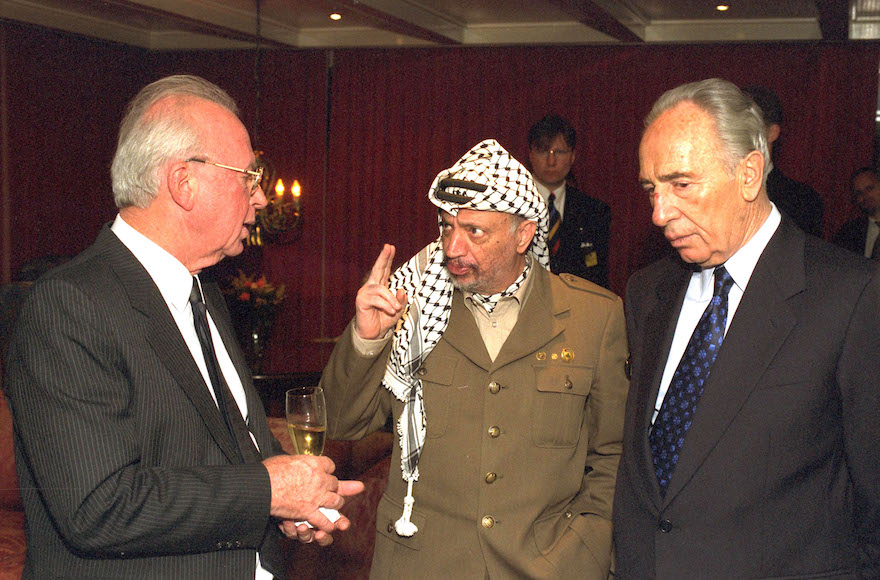This week’s kidnapping of a 19-year-old soldier by Hamas fundamentalists, coming hard on the heels of a mass terror attack in the center of Jerusalem, has placed the severest strain on the Israeli-Palestinian peace process since the two sides signed their accord in Washington 13 months ago.
The entire nation has been gripped by the ordeal, watching Wednesday in bitter, helpless anger as television stations repeatedly played a brief video clip of the kidnapped soldier, Nach-shon Waxman, in the hands of a masked gunman, pleading for the government to release Arab prisoners so that his life would be saved.
Prime Minister Yitzhak Rabin, in a series of direct telephone conversations with Yasser Arafat, head of the Palestinian Authority, declared that Israel held the authority — and Arafat himself –responsible for the soldier’s well-being and eventual return.
Rabin told Arafat on Wednesday afternoon that Israel knew for certain the soldier was being held in Gaza, despite earlier Palestinian statements casting doubt on his whereabouts.
Rabin also told Arafat that the episode represented a fateful test of the Palestinian Authority’s ability to rule in the areas under its control, and to cooperate with Israel in the fight against terrorist forces opposed to peace.
Under the self-rule accord concluded by Israel and the PLO earlier this year, the Gaza Strip and the West Bank enclave of Jericho fell under Palestinian autonomy in May.
U.S. Secretary of State Warren Christopher, in the Middle East this week trying to revive the stalled Israeli-Syrian talks, also called Arafat to urge him to take action against Hamas.
At a session of the Palestinian Authority executive late Tuesday night, Arafat condemned the kidnapping and ordered his security chiefs to make every effort to locate the kidnapped soldier.
Before dawn the same night, Arafat reportedly met with three local Hamas leaders and demanded their help in recovering Waxman alive. The three Hamas leaders reportedly claimed that no one under their command had carried out the abduction.
The kidnappers reportedly are demanding the release of up to 200 Hamas and Hezbollah prisoners being held by Israel, including Sheik Ahmed Yassin, the founder of Hamas who is serving a life sentence in Israel for his involvement in the kidnapping and murder of two Israeli soldiers several years ago.
Although there was no direct confirmation of the kidnappers’ demands on the video clip, the masked kidnapper warned the government not to “make the mistake it made with Nissim Tole-dano,” a border policeman in Ramla who was kidnapped and murdered two years ago. Then, too, the kidnappers ostensibly demanded the release of Hamas and Hezbollah prisoners.
Security sources noted Wednesday that the analogy was weak, because in Toledano’s case, the victim was stabbed to death soon after the kidnapping while Waxman was filmed alive.
In the videotape, sent by Hamas to Israel Television and to Reuters, Waxman’s hands are bound behind his back. A masked Hamas member is holding the soldier’s personal weapon and identity card.
Waxman apparently was abducted while hitchhiking near Ben-Gurion Airport in Lod, near Tel Aviv, on Sunday.
‘HAVE PITY ON US’
At Waxman’s home in Jerusalem, Chief of Staff Ehud Barak, Knesset Speaker Shevach Weiss and Chief Rabbi Yisrael Lau were among hundreds of well-wishers who sought to give moral strength to the distraught family.
The parents appeared on television Tuesday night to appeal to the kidnappers, on religious and humanitarian grounds, to release their son unharmed. Waxman’s mother, Esther, an Orthodox woman who emigrated from the United States 25 years ago, appealed to Hamas in religious terms.
“We all pray to the same God,” she said. “Have pity on us.”
The kidnapping could hardly have come at a more sensitive political moment for the prime minister.
Rabin was preparing to confront opposition attacks over the expected announcement in Oslo on Friday that he and Arafat are to share this year’s Nobel Peace Prize.
Opposition spokesmen have been arguing that Arafat is not worthy of the prize, and that Rabin should not agree to receive it with him. On Wednesday, saddened and embittered by the week’s terrorism, some of Rabin’s aides, too, were questioning the domestic political wisdom of his mounting the rostrum in Oslo on Dec. 10 to receive the prize with Arafat.
To reject the prize, on the other hand, observers and other aides say, could jeopardize the entire peace process.
The same dilemma factored into the prime minister’s decision Tuesday to suspend the ongoing negotiations with the PLO in Cairo. Negotiators were meeting to hammer out details for the next phase of the peace process — Palestinian elections in the West Bank and Gaza.
Rabin recalled Israel’s delegation, headed by Maj. Gen. Danny Rothschild, “for consultations.”
In addition, the Gaza Strip was sealed off from Israel on Tuesday, halting the entry of Palestinian workers into Israel.
But officials in Jerusalem conceded that the suspension cannot continue too long without jeopardizing the peace process.
Just what the long-term implications of this week’s events will be are not certain.
As one Israeli official put it, if Waxman is returned home safely, the Israeli and Palestinian peace initiative most likely will continue.
Such a development, according to this official, could even strengthen the process because it will reassure Israelis of Arafat’s ability to control events in the Gaza.
On the other hand, if Waxman is killed, the Israelis will find it difficult to extend further autonomy to the Palestinians, knowing that Arafat is unable to control extremist forces and to deliver the promises he has made.
JTA has documented Jewish history in real-time for over a century. Keep our journalism strong by joining us in supporting independent, award-winning reporting.
The Archive of the Jewish Telegraphic Agency includes articles published from 1923 to 2008. Archive stories reflect the journalistic standards and practices of the time they were published.




